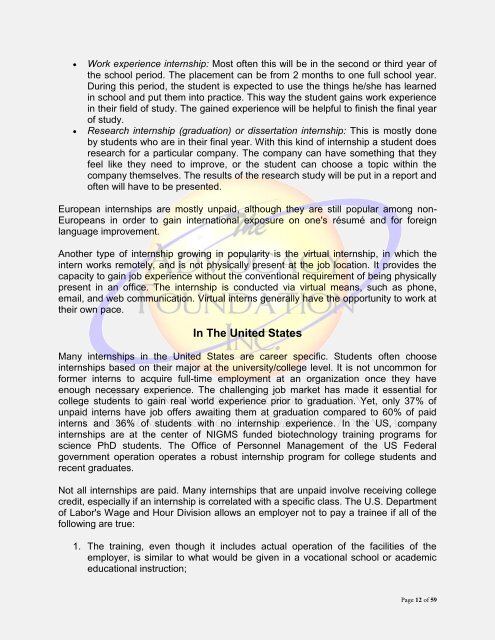Professional Development - Vol. IV, Part I
Professional Development - Vol. IV, Part I
Professional Development - Vol. IV, Part I
Create successful ePaper yourself
Turn your PDF publications into a flip-book with our unique Google optimized e-Paper software.
Work experience internship: Most often this will be in the second or third year of<br />
the school period. The placement can be from 2 months to one full school year.<br />
During this period, the student is expected to use the things he/she has learned<br />
in school and put them into practice. This way the student gains work experience<br />
in their field of study. The gained experience will be helpful to finish the final year<br />
of study.<br />
Research internship (graduation) or dissertation internship: This is mostly done<br />
by students who are in their final year. With this kind of internship a student does<br />
research for a particular company. The company can have something that they<br />
feel like they need to improve, or the student can choose a topic within the<br />
company themselves. The results of the research study will be put in a report and<br />
often will have to be presented.<br />
European internships are mostly unpaid, although they are still popular among non-<br />
Europeans in order to gain international exposure on one's résumé and for foreign<br />
language improvement.<br />
Another type of internship growing in popularity is the virtual internship, in which the<br />
intern works remotely, and is not physically present at the job location. It provides the<br />
capacity to gain job experience without the conventional requirement of being physically<br />
present in an office. The internship is conducted via virtual means, such as phone,<br />
email, and web communication. Virtual interns generally have the opportunity to work at<br />
their own pace.<br />
In The United States<br />
Many internships in the United States are career specific. Students often choose<br />
internships based on their major at the university/college level. It is not uncommon for<br />
former interns to acquire full-time employment at an organization once they have<br />
enough necessary experience. The challenging job market has made it essential for<br />
college students to gain real world experience prior to graduation. Yet, only 37% of<br />
unpaid interns have job offers awaiting them at graduation compared to 60% of paid<br />
interns and 36% of students with no internship experience. In the US, company<br />
internships are at the center of NIGMS funded biotechnology training programs for<br />
science PhD students. The Office of Personnel Management of the US Federal<br />
government operation operates a robust internship program for college students and<br />
recent graduates.<br />
Not all internships are paid. Many internships that are unpaid involve receiving college<br />
credit, especially if an internship is correlated with a specific class. The U.S. Department<br />
of Labor's Wage and Hour Division allows an employer not to pay a trainee if all of the<br />
following are true:<br />
1. The training, even though it includes actual operation of the facilities of the<br />
employer, is similar to what would be given in a vocational school or academic<br />
educational instruction;<br />
Page 12 of 59

















